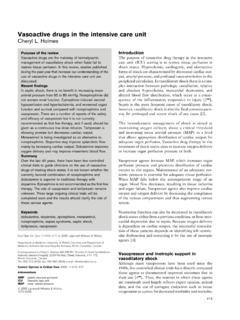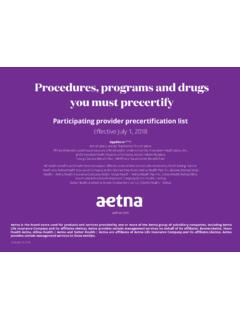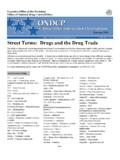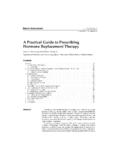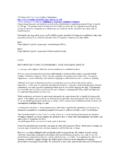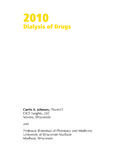Transcription of 240510-Efficacy dementia drugs Drugs avoid …
1 Detail-Document # 240510 . -This Detail-Document accompanies the related article published in- PHARMACIST'S LETTER / PRESCRIBER'S LETTER. May 2008 ~ Volume 24 ~ Number 240510 . Drugs To avoid in Patients with dementia Elderly people with dementia often tolerate Drugs less favorably than healthy older adults. Reasons include increased sensitivity to certain side effects, difficulty with adhering to drug regimens, and decreased ability to recognize and report adverse events. Elderly adults with dementia are also more prone than healthy older persons to develop drug -induced cognitive Medications with strong anticholinergic (AC) side effects, such as sedating antihistamines, are well- known for causing acute cognitive impairment in people with Anticholinergic-like effects, such as urinary retention and dry mouth, have also been identified in Drugs not typically associated with major AC side effects ( , narcotics, benzodiazepines).
2 3 These Drugs are also important causes of acute confusional states. Factors that may determine whether a patient will develop cognitive impairment when exposed to ACs include: 1) total AC load (determined by number of AC Drugs and dose of agents utilized), 2) baseline cognitive function, and 3) individual patient pharmacodynamic and pharmacokinetic features ( , renal/hepatic function).1. Evidence suggests that impairment of cholinergic transmission plays a key role in the development of Alzheimer's dementia . Thus, the development of the cholinesterase inhibitors (CIs).
3 When used appropriately, the CIs (donepezil [Aricept], rivastigmine [Exelon], and galantamine [Razadyne, Reminyl in Canada]) may slow the decline of cognitive and functional impairment in people with dementia . In order to achieve maximum therapeutic effect, they ideally should not be used in combination with ACs, agents known to have an opposing mechanism of ,2 Roe et al studied AC use in 836 elderly Use of ACs was found to be greater in patients with probable dementia than healthy older adults (33% vs. 23%, p = ). Patients with dementia may be more apt to take ACs because of increased prevalence of urinary incontinence (commonly treated with ACs), use of AC antipsychotic agents for behavioral and psychotic symptoms, and side effects caused by CIs.
4 When selecting drug therapy for patients with dementia , the use of AC medications should be avoided, or at least limited to medications within a therapeutic class that have the least AC adverse effects. The following table summarizes agents associated with causing worsening cognitive function in patients with dementia . Therapeutic alternatives are included when possible. Selection of Drugs in Dementia1,2. Drugs to avoid Therapeutic Alternatives Comments Analgesics Narcotic Meperidine (Demerol) Mild pain: APAP, short-acting All narcotics Use cautiously in elderly, Pentazocine (Talwin) NSAID ( , ibuprofen) increased risk of respiratory depression.
5 Propoxyphene (Darvon) Moderate or severe pain: Meperidine Use cautiously in all elderly, morphine, hydrocodone/APAP increased risk of seizures with renal (Vicodin, etc), oxycodone impairment. (OxyContin, etc), Tramadol Daily doses > 300 mg not oxycodone/APAP (Percocet, etc), recommended in patients over 75 years per fentanyl patch (Duragesic) product labeling. (Use cautiously at Topicals (neuropathic pain, lowest effective dose in patients >75 years arthritis): lidocaine (Lidoderm), per Canadian product labeling). capsaicin (Zostrix, etc)6. More.
6 Copyright 2008 by Therapeutic Research Center Pharmacist's Letter / Prescriber's Letter ~ Box 8190, Stockton, CA 95208 ~ Phone: 209-472-2240 ~ Fax: 209-472-2249. ~ (Detail-Document # 240510 : Page 2 of 4). Drugs to avoid Therapeutic Alternatives Comments Antiarrhythmics Disopyramide (Norpace) Depends on type of arrhythmia; Negative inotrope and anticholinergic6. for atrial fibrillation, digoxin, quinidine, procainamide, sotalol, flecainide7. Antidepressants Tricyclic Antidepressants (TCAs) Trazodone (for insomnia) If TCAs are needed, agents with lower AC.
7 Amitriptyline (Elavil) SSRIs effects are recommended: Amoxapine (Asendin) Bupropion (Wellbutrin) (for Desipramine (Norpramin). Clomipramine (Anafranil) cardiac patient) Nortriptyline (Pamelor, Aventyl). Doxepin (Sinequan) Mirtazapine (Remeron) (for Imipramine (Tofranil) insomnia or anorexia). Protriptyline (Vivactil) Neuropathic pain: topicals Trimipramine (Surmontil) (lidocaine [Lidoderm], capsaicin [Zostrix, etc])6. Antiemetics Cyclizine (Marezine) Ondansetron (Zofran) Metoclopramide and prochlorperazine are Dimenhydrinate (Dramamine) Granisetron (Kytril) associated with less AC side effects than Meclizine (Antivert) Dolasetron (Anzemet)6 other antiemetic agents.
8 However, both may Promethazine (Phenergan) cause extrapyramidal symptoms. avoid long Trimethobenzamide (Tigan) term use. Antiparkinsonian Anticholinergics (ACs). Benztropine (Cogentin) For Parkinson's: Anticholinergic Biperiden (Akineton) agents are best for tremor in early Procyclidine (Kemadrin) disease in patients with good Trihexyphenidyl (Artane) cognitive ,8 For elderly patients unable to take ACs, or with more advanced disease or additional symptoms, levodopa is For antipsychotic side effects: decrease antipsychotic dose or try an atypical ( , risperidone)6.
9 Antipsychotics Chlorpromazine (Thorazine) Preferred Agents: Atypicals associated with increased mortality Clozapine (Clozaril) Haloperidol (Haldol) when used to treat behavioral problems in Mesoridazine (Serentil) Risperidone (Risperdal) elderly with dementia6. Pimozide (Orap) Secondary Agents: Promazine (Sparine) Aripiprazole (Abilify) Olanzapine associated with AC Thioridazine (Mellaril) Olanzapine (Zyprexa). Triflupromazine (Vesprin) Quetiapine (Seroquel). Ziprasidone (Geodon). Anxiolytics Benzodiazepines Buspirone (Buspar) If benzodiazepine required for anxiety, SSRIs consider short acting agent (appropriately dosed): alprazolam (Xanax), lorazepam (Ativan), oxazepam (Serax).
10 6. Copyright 2008 by Therapeutic Research Center Pharmacist's Letter / Prescriber's Letter ~ Box 8190, Stockton, CA 95208 ~ Phone: 209-472-2240 ~ Fax: 209-472-2249. ~ (Detail-Document # 240510 : Page 3 of 4). Drugs to avoid Therapeutic Alternatives Comments Antihistamines, single and combination products containing: Azatadine (Optimine) Cetirizine (Zyrtec), fexofenadine Anticholinergic adverse effects, urine Brompheniramine (Dimetane) (Allegra), loratadine (Claritin), retention, confusion, sedation Carbinoxamine desloratadine (Clarinex), Chlorpheniramine (Chlor- levocetirizine (Xyzal), low-dose Trimeton) diphenhydramine7.
